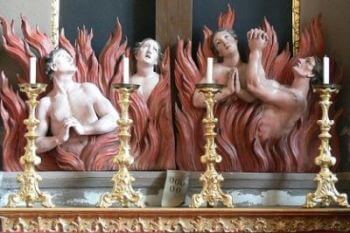 “I know that good does not dwell in me, that is, in my flesh.” Saint Paul was an imperfect saint. Catholics who are super strict about practicing our faith and are judgmental about those who are not, should pay attention to today’s first reading for mass. So many Catholics, including some members of the clergy have pulled this verse out of scripture, to support their view that spiritual perfection consists of a lack of sin:
“I know that good does not dwell in me, that is, in my flesh.” Saint Paul was an imperfect saint. Catholics who are super strict about practicing our faith and are judgmental about those who are not, should pay attention to today’s first reading for mass. So many Catholics, including some members of the clergy have pulled this verse out of scripture, to support their view that spiritual perfection consists of a lack of sin:
“Be perfect, therefore, as your heavenly Father is perfect.” Mt 5:48
This is the danger in pulling out a single verse of scripture and basing your entire spiritual life on it, without considering the context in which it was written. Matthew 5: 43-48 is actually about love of neighbor, not lack of sin. Today, Saint Paul, (with an emphasis on his sainthood) demonstrates to us that an inclination to sin, or even committing sins does not mean that you are less of a Christian because of them. On the contrary, it is quite obvious that Saint Paul struggled against sins of the flesh according to what he wrote in the first reading for mass today. Struggle is the key word. Without resistance to our sinful inclinations they can take over our lives. Saint Paul explains how miserable the war is between the desire to live a holy life and the sinful inclinations of our own bodies.
Poor Saint Paul. He didn’t have access to the sacrament of confession that modern Catholics do. However, it should be noted that he did confess his sins the best he could, by the words that he wrote in the letter for today’s first reading. Sins of the flesh are usually considered a mortal sin and need to be brought to confession at the first opportunity. Frequent confession is the best means of defeating these tendencies within us, for both men and women.
Jesus is also addressing venial sins in today’s gospel:
“When you see a cloud rising in the west you say immediately that it is going to rain – and so it does; and when you notice that the wind is blowing from the south you say that is is going to be hot – and so it is.”
This is so very true in the spiritual life. When you start noticing small venial sins creeping in, it is a sign that mortal sin is on the horizon. That is why it is important to go to regular (monthly) confession and nip the venial sins in the bud so they don’t turn in to mortal sins on down the road. Your conscience knows when you have committed a sin, even if it is a venial sin, and it should be confessed.
Venial sins are forgiven in confession. It cleans the soul. Today’s gospel is the basis of the Catholic belief in purgatory:
“Why do you not judge for yourselves what is right? If you are to go with your opponent before a magistrate, make an effort to settle the matter on the way; otherwise your opponent will turn you over to the judge, and the judge hand you over to the constable, and the constable throw you into prison. I say to you, you will not be released until you have paid the last penny.” Lk 12: 57-59
It is understandable that we commit both mortal and venial sins due to our fallen human nature. We are all susceptible to this. That is why we have communal penance services, so that we can acknowledge together, that we are not perfect. No one should judge others for their weaknesses, but another reason is because they may be going to confession to try and overcome their weaknesses. It may take a while.
However, we all need to work on overcoming our venial sins, because it will be much more difficult to handle in purgatory. The Catholic church teaches us about the “fires of purgatory” for a reason. It will no doubt be painful. That should be motivation enough to urge us toward frequent confession and working to overcome the inclination to sin that we all have. We need to put to death the venial sins during our life, because it will be more painful for us later in purgatory if we don’t.
Many non-Catholics do not understand the scriptural basis for the Catholic belief in purgatory. Basically, many people die with unresolved issues related to the sins they committed in life and would not immediately feel comfortable in heaven because of the state of their soul. For an example, if a person committed a murder, but received absolution for this sin moments before death, that person did not have time to fully cope with what happened. They are assured of God’s forgiveness and will enter heaven, but until they have resolved this situation they would not feel comfortable immediately going to heaven.
The bible also says that nothing unclean shall enter heaven. (Rev 21:27) Those who are in heaven, have been purified by the blood of Christ and cleansed of all traces and effects of sin through the experience of purgatory. In this way, they are healed and made perfect before they enter God’s presence. It is like taking a shower and putting on fresh clothing that is fit for a wedding.
Daily Mass Readings:
Rom 8: 1-11 / Ps 24: 1-6 / Lk 13: 1-9
